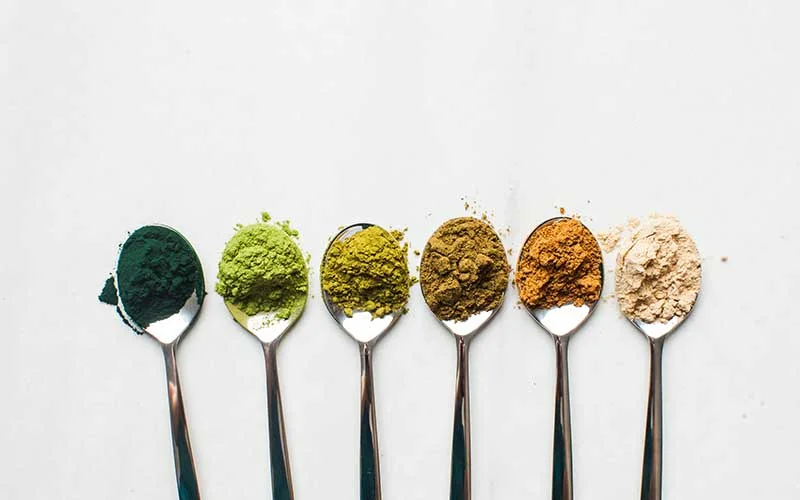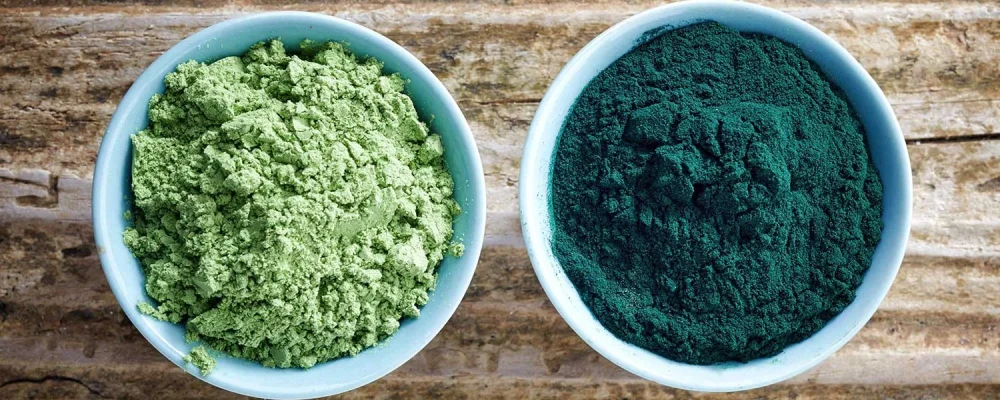Ever wonder about those superfood powders everyone’s talking about? Well, here’s a question for you: Do you know the difference between organic and non-organic options? Don’t worry if you’re not sure – we’re here to guide you through it all.
Whether you’re a health enthusiast or just curious, let’s dive into the world of superfood powders and figure out which one might be right for you. Get ready for a journey of discovery that’ll help you make informed choices for your well-being and the environment.
Organic Vs. Non-Organic Superfoods: Key Differences
| Key Differences | Organic Superfood Powders | Non-Organic Superfood Powders |
| Growth Method | Naturally grown without chemicals | May use pesticides and chemicals |
| Nutrient Content | Rich in vitamins, minerals, antioxidants | Similar nutrient content, but might be affected by chemicals |
| Environmental Impact | Eco-friendly farming practices, benefits soil health and insects | May harm environment due to chemical use |
| Certifications | Look for labels like “USDA Organic” or “EU Organic” | May lack organic certifications |
| Cost | Typically higher due to natural methods | Usually more budget-friendly |
| Taste | Pure taste, not influenced by chemicals | Chemical traces might affect taste |
| Health Benefits | Boosts overall health, supports natural defenses | Nutrient-rich, but potential pesticide residues |
| Long-Term Effects | Minimal exposure to harmful chemicals | May have long-term health concerns |
| Sustainability | Supports eco-friendly farming practices | May contribute to environmental issues |
Organic Superfood Powders

Organic superfood powders are like the superstars of the nutrition world. They’re grown using natural methods that take care of the earth. Think of it as letting nature do its thing and keeping away harmful chemicals. These practices keep the soil healthy, promote a mix of different plants and creatures, and respect the balance of the environment [1].
Definition and Characteristics
Organic superfood powders are special because they’re grown naturally, without harmful chemicals. Choosing organic powders also benefits the environment by using eco-friendly farming practices.
Nutritional Value and Advantages
Organic superfood powders are more than just a trend; they are brimming with essential vitamins, minerals, and antioxidants that promote overall well-being. Antioxidants play a vital role in protecting your body from harmful elements that can lead to illness. Opting for organic superfood powders not only supports your personal health but also boosts your body’s immune system while contributing to healthy-looking skin.
Environmental Impact
Ever thought about how your choices affect the world around you? Organic superfood powders are kind to the planet. They’re grown in a way that’s kind to the environment. Organic farming practices keep the soil in good shape by rotating the crops and using natural materials for fertilizing. No harmful chemicals mean clean water and happy insects that help plants grow.
Certifications and Labels
Labels are like a thumbs-up for your superfood powders. Check for labels like “USDA Organic” or “EU Organic.” These labels are proof that the product is organic. Also, read the list of ingredients carefully. The journey to health starts with knowing what’s in your powder.
Non-Organic Superfood Powders

On the other hand, non-organic superfood powders are made without following strict organic rules. They still have good stuff inside, like vitamins and minerals, but they might have been grown using pesticides and fertilizers. These chemicals can be bad for the environment and could leave traces within the final product you eat. Opting for non-organic powders means you’re not aligning with environmentally sustainable practices of organic farming and may miss out on some of the health benefits
Processing and Additives
Non-organic superfood powders are like the rebels of the group. They have nutrients, but they might have used different methods to grow. Regular farming often uses chemicals to help plants grow, which might end up in your powder. Some non-organic powders even add extra additives or chemicals, to make them taste better and last longer.
Nutritional Considerations
Let’s talk about the good stuff inside. Organic and non-organic superfood powders might be similar, but organic ones often have more nutrients. That’s because they skip the chemicals that can mess with the good stuff in the powder. When choosing, remember that non-organic powders may have an altered taste, due to their chemicals [2].
Cost and Accessibility
Money matters, right? Organic superfood powders might cost a bit more. Why? Because growing them takes more time and effort using natural methods. On the other hand, non-organic powders could be cheaper. If you’re trying to save money, they look appealing. But remember, investing in your health can be a good idea in the long run.
Environmental Concerns
What goes into your body also affects the world around you. Regular superfood production might be easier, but it can have a downside. The chemicals used can harm not just pests but also helpful insects and the water we use. Choosing organic food is a way to help the environment and reduce our food’s impact.
Making Informed Choices
When you’re picking superfood powders, being smart is important. That means reading labels to know what’s inside, thinking about your health, and considering the earth. If the label says “organic,” that’s a good sign. If you’re worried about chemicals, go for organic. And think about how your choice affects the planet. Talking to experts and looking up information can help you decide. Knowing more helps you pick powders that are good for you and the world around you.
Reading Labels and Ingredients
Starting your superfood journey means reading labels. Look for well-known labels like “USDA Organic” or “EU Organic.” Those labels mean something important. And when looking at the ingredient list, watch out for extra things that might be added to the powder. Being informed starts with knowing what you’re putting in your body.
Personal Health Considerations
Your health journey is special, so the superfood powder you choose should align with that. If you’re worried about chemicals or their impact on your health, you might lean toward organic. But if you’re watching your budget, non-organic options could be better for your wallet.
Ethical and Environmental Factors
Remember, what you eat isn’t only about you. It’s about the bigger world, too. Picking organic superfood powders isn’t only about staying healthy; it’s also about taking care of the planet. By supporting organic ways, you’re helping the earth and saying you care about your health and the environment.
Consulting Experts and Research
Sometimes, getting advice from experts is a good idea. Nutritionists, dietitians, and health pros can guide you based on your needs. And remember the power of research. Reading about studies comparing organic and non-organic superfood powders can help you make a smart choice backed by science.
FAQs
What Are Superfood Powders?
Superfood powders are like nature’s multivitamins, packed with concentrated nutrients from various plant-based sources.
What Is the Difference Between Organic and Non-organic Superfood Powders?
The difference boils down to how the ingredients are grown and processed. Organic powders are produced without synthetic chemicals, while non-organic ones may use them.
Are Organic Superfood Powders More Nutritious?
Yes, organic powders often come out on top in the nutrition department. They skip synthetic chemicals that can interfere with nutrient content.
Are Non-organic Superfood Powders Safe to Consume?
While generally safe, non-organic powders might contain pesticide residues, which could pose long-term health concerns. It is important to know the company behind the products they are selling and what type of control measures they have in place.
How Are Superfood Powders Processed?
Superfood powders are made by drying and grinding nutrient-rich foods into a powdered form, with processing methods varying depending on the ingredients.
What Certifications Should I Look for in Organic Superfood Powders?
Watch for well-known certifications like USDA Organic or EU Organic labels, ensuring the product meets stringent organic standards.
Are there any potential risks associated with consuming non-organic superfood powders?
Yes, there are concerns about pesticide residues and their potential impact on health, but more research is needed to understand the risks fully.
Are there any legal regulations for labeling Organic and Non-organic superfood powders?
Absolutely. Different countries have regulations to ensure transparency and accuracy in labeling organic and non-organic products.
Can I Grow My Superfoods Organically?
Absolutely! Many superfoods can be grown at home using organic gardening, directly connecting you to your nutrient sources.
Are Any Studies Comparing the Nutritional Content of Organic and Non-organic Superfood Powder?
Yes, studies have looked into the differences, but more research is needed to build a complete picture.
Final Thoughts
In the world of superfood powders, the choice between organic and non-organic isn’t just about your health; it’s about the planet’s health, too.
Organic options offer a double dose of goodness, supporting your well-being and sustainable farming practices. While non-organic choices might be more budget-friendly, they could come with pesticide residues and environmental concerns.
Armed with knowledge about labels, ingredients, and the bigger picture, you can make a choice that nourishes your body and sends a message that health and sustainability matter.
Source
[1] Barsby, J. P., Cowley, J. M., Leemaqz, S. Y., Grieger, J. A., McKeating, D. R., Perkins, A. V., Bastian, S. E. P., Burton, R. A., & Bianco-Miotto, T. (2021). Nutritional properties of selected superfood extracts and their potential health benefits. https://www.ncbi.nlm.nih.gov/pmc/articles/PMC8628624/
[2] Proestos, C. (2018). Superfoods: Recent Data on their Role in the Prevention of Diseases. https://www.foodandnutritionjournal.org/volume6number3/superfoodsrecent-data-on-their-rolein-the-prevention-of-diseases/
RV Team
* Reviewology is in partnership or collaborates with top brands highlighted on this site, including those occupying the top ranking positions.
Additionally, we earn affiliate commissions from products showcased on this website when you make a purchase through the provided links on Amazon or the company website directly.
We appreciate your support using our links to purchase your favorite brands or newly discovered brands.
Latest updates
I Thought I’d Always Feel Tired, Fat, and Forgotten—Until This
310 Greens vs AG1
The Truth About 310 Greens: A No-Nonsense Review of This Popular Supplement
Popular
I Thought I’d Always Feel Tired, Fat, and Forgotten—Until This
310 Greens vs AG1
The Truth About 310 Greens: A No-Nonsense Review of This Popular Supplement
© 2024 Reviewology. All Rights Reserved.
